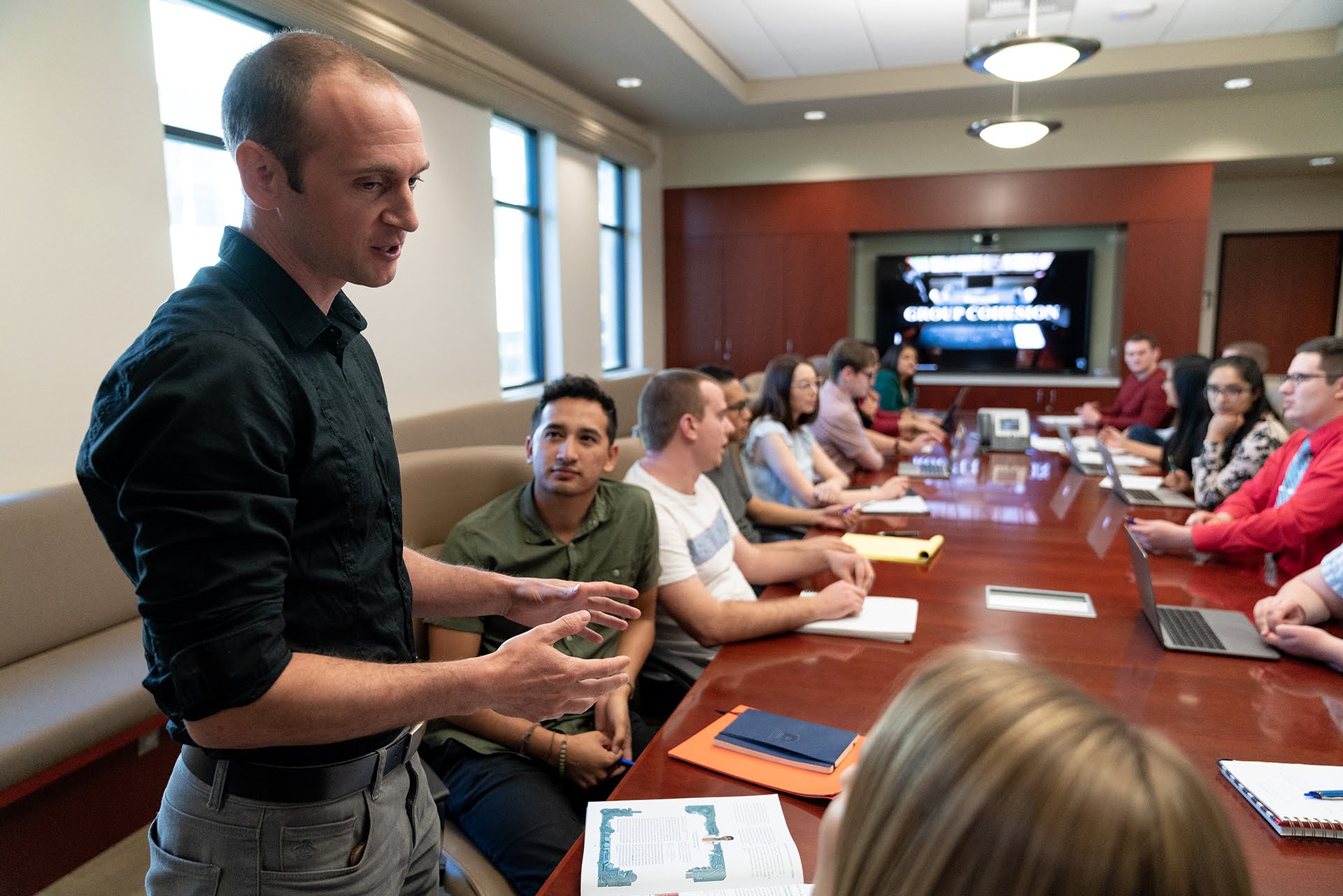Where has your mind gone?
By Dr. Joshua Fuller

As human beings we’ve developed the ability to imagine things that don’t exist or never could. We have the capacity to move ourselves to a cognitive representation of a differing place and time. This capacity to make mental simulations provides much of the bedrock for our accomplishments and the creation of modern as well as historic marvels. For instance, you can imagine eating a chocolate fudge popsicle while sitting on a bench, the hot sun beating down on your face and beads of sweat forming on your nose. You can imagine the freezing bone chilling wind that howls through the valleys in January as you walk home from school with your brown knit hat and goose-filled down jacket. Imagining these scenarios gives you the opportunity to prepare for them. You might anticipate the cold and pack your gloves in your bag so your hands won’t freeze, or you might imagine the heat from the sun on a cloudless hot summer day and decide to wear shorts instead of pants. The ability to create a representative world in the mind is quite possibly our greatest asset.
In addition to creating virtual cognitive worlds, we can simulate events. For example, when sitting at home watching your favorite TV show, you suddenly think about your homework and what your teacher would say tomorrow at school. You can simulate the conversation in your mind. She would ask, “Did everyone do their homework?” You look at the ground trying to be as invisible as possible hoping she forgets to check. Thinking of events like these, though they are considered unpleasant mind wanderings, motivates us to do our homework.

As it turns out, this is more pertinent to your happiness than what activities you engage in or many other happiness assessments. In a study by Matthew Killingsworth and Daniel Gilbert, participants reported their happiness, current activity, and if their mind was wandering. They pioneered a web application that allowed participants to report their immediate experience at the time of questioning via iPhone. The process by which data is collected from real-world emotional experience is called the experience sampling method (ESM). This type of data collection is quite valuable in that it reduces potential biases contained in other survey methods. The researchers asked at random times during the day how happy were participants, was their mind wandering, and what participants were doing. Based on the responses, the researchers found that unpleasant wanderings of the mind caused lower levels of happiness.In fact, to where the mind wandered effected happiness more than the activities that people were doing. In another text, Daniel Gilbert explains some of the rationale for why the mind wanders and why it is so helpful. It seems logical that mind wanderings and dreams as well frequent negative or unpleasant thoughts. When sitting in an airplane waiting to takeoff, we think of it crashing into the sea or an engine failing. Gilbert explains that this most likely evolved to combat negative events. If we think of the worst case scenario and it doesn’t happen, we feel good or at least relieved that we landed safely. These constant worst case scenarios that plague our minds mollify the impact of negative events but come at an emotional cost.Those that had wandering minds during an ESM experiment reported being much less happy than anyone else.

Perhaps being “in the moment” can have positive impact on our mental health. A multitude of research has demonstrated that specific activities can bring our attention to a focused present time frame. Activities like prayer, writing letters of gratitude, or journaling have been shown to increase mental health. These effects aren’t limited to just feeling happy. Practiced on a regular basis, these interventions can promote productivity, social relationships, and even help you live longer. If this sounds like something you would like more information on, I would encourage you to read The Happiness Advantage by Shawn Achor or The How of Happiness by Sonja Lyubomirsky.
References:
Killingsworth, M. A., & Gilbert, D. T. (2010). A Wandering Mind Is an Unhappy Mind.Science,330(6006), 932. doi:10.1126/science.1192439
Gilbert, D. (2006).Stumbling on happiness. New York, NY US: Alfred A. Knopf.
What are your thoughts? Share below-CBU student comments left within a week of the publication of this blog will be entered into a raffle for a CSHB external battery to keep your phone charged when you are on the go. Winners notified via email.
 Dr. Fuller is an Industrial / Organizational Psychologist, graduating from Seoul National University in South Korea with a doctorate in social psychology. He specializes in organizational health / well-being and is an assistant professor of psychology at California Baptist University (CBU). In his role at CBU, he serves as the Director of the Organizational Health Lab in the College of Behavioral and Social Sciences and typically teaches courses in statistics, research methods, personnel recruitment and selection, social psychology, and I/O psychology. Beyond his work in education, his research has been disseminated in multiple countries at conferences and in journal publications. His research interests include psychological well-being, happiness, culture and cognition, and organizational development. https://joshfulleriop.wixsite.com/orghealth
Dr. Fuller is an Industrial / Organizational Psychologist, graduating from Seoul National University in South Korea with a doctorate in social psychology. He specializes in organizational health / well-being and is an assistant professor of psychology at California Baptist University (CBU). In his role at CBU, he serves as the Director of the Organizational Health Lab in the College of Behavioral and Social Sciences and typically teaches courses in statistics, research methods, personnel recruitment and selection, social psychology, and I/O psychology. Beyond his work in education, his research has been disseminated in multiple countries at conferences and in journal publications. His research interests include psychological well-being, happiness, culture and cognition, and organizational development. https://joshfulleriop.wixsite.com/orghealth
29 Comments
This study on positive psychology could be a new intervention for anxiety, depression. I can see this intervention being used in one of those mental health gyms. There must be various cognitive techniques in therapy that might be able to invoke this. The experience sampling method is very interesting in how it invokes the participants to utilize the survey at different times of the day, which is very brilliant the way I see it. I will be reading the book by Shawn Anchor and hope to find more insight into positive psychology. Thank you Dr.Fuller for taking your time to write this blog post!
Lawrence, thank you for your insight.
I believe that the imagines we create in our minds about scenarios that can happen and those that have happened are incredibly important to be aware of as Dr Fuller states. I agree that thinking into the future can help us better prepare for potentially detrimental things coming our way even if it is just as simple as thinking it will be cold so bringing a jacket.
Julia, thank you for your insight.
I think this is interesting that we typically think of the worse case scenarios and that by doing so we typically are less happy because of it. This really shows the power of living in the moment.
Braden, I am glad that you found the blog post interesting.
Over thinking is a flaw that most people have and it can lead a person to some dark places. Reading this blog was satisfying because of the accuracy I felt it obtains. Most people tend to feel unhappy when they are left with their thoughts. They tend to catastrophically think instead of valuing what is happening in the moment. This post is relatable for a lot of people, my self included, so it was pleasant to understand my emotions that derive from my thinking processes so that I can work on them in the future.
Samantha, I am glad that this post resonated with you and provided you with some insight. Thank you for sharing.
Dr. Fuller,
Reading this post I thought of the phrase “hope for the best expect the worst” which is a phrase I hear often and have used myself. The mindset of the phrase above invites the negative thoughts you explained and allows worry to settle in. When I started focusing on being in the present and expressing gratitude over what I do have, instead of complaining about what I do not have, I noticed not just a mind transformation, but also a heart transformation. We start to crave the positivity and well being that comes from being in the moment and journaling.
Dr. Fuller, I think this was a fantastic blog. The information you have discussed can really make one realize that their mindset greatly affects their mood. This can be especially important in those struggling with mental health. If one changes their mindset, they may be able to notice an increased, positive mood. I also noticed that the activities you listed that that can bring one “in the moment” are similar to those recommended as grounding techniques fro those struggling with anxiety. Whether someone is struggling with mental health or not, the points you have made in your blog are great to be mindful of in day to day life.
Interesting thoughts and information, Dr. Fuller. I found this blog incredibly interesting and the research findings in the study very informative. The idea of being “in the moment” positively impacting our mental health is an idea worth trying in my opinion. I tend to have a wandering mind, so knowing what the ESM experiment reported, I want to make an effort to live and think in the moment.
This post intrigued me because I often find my mind wandering like many others I’m sure. Sometimes, my mind wanders to a happy memory. Other times, like the article suggests, my mind pictures the absolute worst-case scenario. It was interesting to find out that people who daydream often are less likely to be happy, but I think the author makes great points about grounding oneself in the moment to produce happiness.
Well written Dr. Fuller! I was browsing through some of these blogs and was immediately intrigued by the topic that you had written about. There are a couple of aspects that stood out to me during this read and one of them being just how powerful are minds can be. They can either work for you, or against you depending on your mindset. Throughout a long and stressful day, we as humans tend to worry about the next task we have to complete and often do so with less than enthusiastic mindset. That brings up the “living in the moment”, part of you writing. Although I only agree with that statement to a certain extent, I believe practicing being focused on the task at hand in the moment is the best way to complete that. I have personally made the mistake of thinking about the next task too soon and the current task that is right in front of me suffers sub par work as a result which can lead to disappointment in one’s self. The second aspect I wanted to address was the effect that the mind has on mental health. We often defeat ourselves with our own mind by imagining the worst possible scenario. I will definitely try some of those present time frame activities for the sake of my own mental health.
This was a great read, and I’m looking forward to reading more in the near future.
Phil, Thank you for your illumination of the post. I am glad that you found the post useful and that it has inspired you to use some of the techniques in your own personal life.
I appreciated learning more about the benefits and harms of a wondering mind. this is definitely a problem that I have experienced, that is the idea that wondering about stressful scenarios can cause one to be stressed. However, I did not realize that my mood could be related to the stressful thoughts that I was thinking.
I agree with your thinking. If everyone was not so attached to their phones, then we would have a more fulfilling life because we would be paying attention to more of the things around us. One of the things that my mom always tells me is that she hates people who record a whole concert on their phone and the whole time they are looking through the screen of their phone. Did they really watch a concert or did they watch their phone screen recording the concert they were at? A lot of people record concerts to be able to say that they were there and they were within arms length of Justin Bieber or one of their favorite artists and if you tell someone that and you don’t have pictures or videos to prove it, then they won’t believe you. So that is why they do it; to get other people’s approval and affirmation. But if you set the phone down and watch the concert without your phone, you will be living in the moment and you won’t need that affirmation anymore. You can be your own affirmation. I used to use social media a lot because I wanted affirmation from others that I was good enough or pretty enough, but one day it clicked that I don’t need anyone to tell me if I am good enough. I am the only person that can decide that. I am my own affirmation.
Dr. Fuller,
I understand how frequent unpleasant wonders of the mind can cause negative reactions in human conception, however, I am drawn towards the effects of pleasant wonders. Daniel Gilbert explained that a wondering mind is helpful, I don’t think we can base our understanding of a wondering mind on the worse case scenario. A wondering mind in class will distract the student from important information, however a wondering mind can see the distress signs of another student in class going through depression or just a hard time. Sometimes my youth that live in the moment make decisions that ruin their life and once they harness the power to “find a happy place” or escape from reality they find that they are much more happy. I would love to hear follow up on this concept, thank you.
Kevin Bouldin
It was quite interesting to see how what we think is protecting our selves actually isn’t. We tend to image the worse scenarios so we won’t be disappointed when it happens or so we can feel relieved when something of “less” magnitude happens but yet doing that can actually cause us to have lower levels of happiness. It makes sense so because it’s like adding unnecessary stress, but it’s something that I tend to find myself doing often. I feel like we are so busy thinking of our next move that we do forget to live in the now, I think working work on that more is great advice. It’d be interesting to see a study be done on people who do these activities that help you live more in the now versus people who don’t engage in those activities.
Dr. Fuller,
Thank you for such an exciting post! It would be interesting to continue to do more research on this topic. While I was reading the post, I couldn’t help but to think about how this can also apply when were are in love with someone, and how we do certain things to prepare for the conversations or interactions with that special someone.
William, Thank you for providing some interesting insight into how this concept might apply when couples are in love.
I like to think of mental health from well-being and happiness perspective. Reading your post made me to realize about the importance of being in the moment. I would love to read The How of Happiness by Sonja Lyubomirsky and learn more.
I was very interested when reading about this article and our mind. Our minds do suddenly bring up reminders of what would have to be done, what was missed or forget something and be reminded at the most random times. I think that when our mind wanders off, there could be a reason why it wanders. Activities always helps keeps a person busy and not think about those thoughts or have our mind wander off
After reading this article Where has your mind gone, I have gotten more of an understanding of why our minds think the way that they do. It is interesting to think that we as humans visualize things that are not there or can imagine things that are satisfying to us but not visual for other people to see. This article by Dr. Fuller was very interesting to read because i did not know but somethings that we imagine doing are because we are preparing ourselves for that scenario. That is so interesting for me to hear
and read about because at times I will be doing something and think oh no I have an exam and then realize I am preparing myself to take that exam.
Delacy, I am glad you found this post captivating. Thank you for sharing your experience and how this post has resonated with you.
It is incredibly interesting to note how our emotions and overall state of mind are affected more by the thoughts we have than the actual activities we do. This goes to show that the way we think has a drastic affect on how we act and how we feel instead of the other way around. I think it was important how you noted that being “in the moment” can bring us closer to a state of happiness. I think often people get caught up in the what if and imagine the worse case scenario and that in turn makes it so they actually have a bad experience. A lot of the situations in our lives seem to be the way they are because of the state of mind we were in when we made that decision and I personally have come to realize that and have tried to adjust my thinking for that reason.
Hi Dr. Fuller!
Your posts prove to be more and more insightful. A wonderful and wise way to remind everyone that living within the moment and taking full advantage of the reality that we walk in is beneficial to our mental health. Ever since I began a regular prayer schedule and a few journals consistently it has improved the flow of my memory and my overall well being as an individual. As humans it is easy for us to get swept away in our own thoughts but it can also be harmful for us. Keeping our feet planted firmly on the ground and gaining structure is sometimes better than letting our minds wander through the clouds.
Thank you Dr. Fuller!
It is amazing how applicable this is for our current situation. I have often heard people say, “I would be doing X if it weren’t for covid”. With our ability to go outside being limited, it is important that we do not let our minds wander. Though, it is very difficult to be in the moment when little is happening in the moment. Without even realizing it, I have practiced what you have taught. You recommended activities that promote being in the moment. Similarly, I have jumped into hobbies in order to keep myself busy. Without these hobbies, I imagine that I would have had a much more negative outcome.
Reading this post made me realize that when I am “living in the moment” I actually am a lot happier, and I have noticed it with a lot of my family and friends too. I always struggle to live in the moment because my mind always ends up wandering to worst case scenarios, but now that I am more aware of how our imagination affects our emotions, I may be able to catch my mind wandering and stop it before it affects me. This is also a technique I can use for therapy in my future career. This was a very insightful and eye-opening post.
I like how this article talks about how imaginative we are and how we like to create things and how we can express ourselves by living in the moment and how we can often make our minds wander to the future wondering what will happen to us.